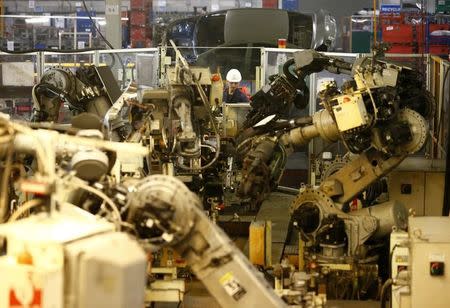UK recovery more lopsided as manufacturing slips, consumer loans soar
By Andy Bruce and David Milliken LONDON (Reuters) - Hopes that Britain's economic recovery will become less reliant on big-spending consumers ebbed further on Friday as data showed manufacturing growth weakened at the end of last year while lending to individuals soared. Sterling hit a 16-month low after the Markit/CIPS UK Manufacturing Purchasing Managers' Index, a closely-watched monthly business survey, hit a three-month low in December, missing all forecasts in a Reuters poll. Separate data from the Bank of England showed lending to consumers surged at its fastest rate in nearly a decade in the three months to November, and business lending showed signs of picking up despite a slowing housing market. Taken together, the figures suggested Britain's upturn -- one of the strongest among advanced economies in 2014 -- will remain biased towards consumption rather than other sources of growth such as investment and exports. With a national election due in May in which the economy will take centre stage, signs of weaker manufacturing growth may concern Chancellor George Osborne. "This morning's UK data releases show that the long hoped-for economic rebalancing story is not playing out as envisaged," said James Knightley, economist at ING. "With employment and real household disposable income set to rise robustly in 2015 consumer spending looks set to become the UK's main growth engine once again." While holding above the 50 threshold for growth, the manufacturing PMI fell to 52.5 from November's 53.3, well short of the Reuters poll consensus of 53.7. Growth in new factory orders also dropped to a three-month low and export orders stagnated. For the fourth quarter, the PMI showed the weakest growth in a year-and-a-half -- boding ill for official manufacturing data for the end of 2014. CREDIT-FUELLED RECOVERY? The BoE credit data showed consumer lending beat economists' expectations to rise at an annualised 8.3 percent in the three months to November, a pace last seen in October 2005. There were also signs that businesses' reluctance to borrow from banks eased, particularly among smaller firms which have historically found it hardest to get credit. Net lending to non-financial businesses dropped by 149 million pounds, the smallest decline since August, and lending to small businesses rose by 286 million - the biggest increase since records started in May 2011. Year-on-year, both types of lending are down by around 2 percent, the smallest declines since records started in 2012. The BoE data also added to evidence that Britain's housing market has cooled off markedly. The number of mortgages approved dropped to its lowest since June 2013, though the size of the decline in November was less than economists had expected. (Editing by John Stonestreet)

 Yahoo News
Yahoo News 

